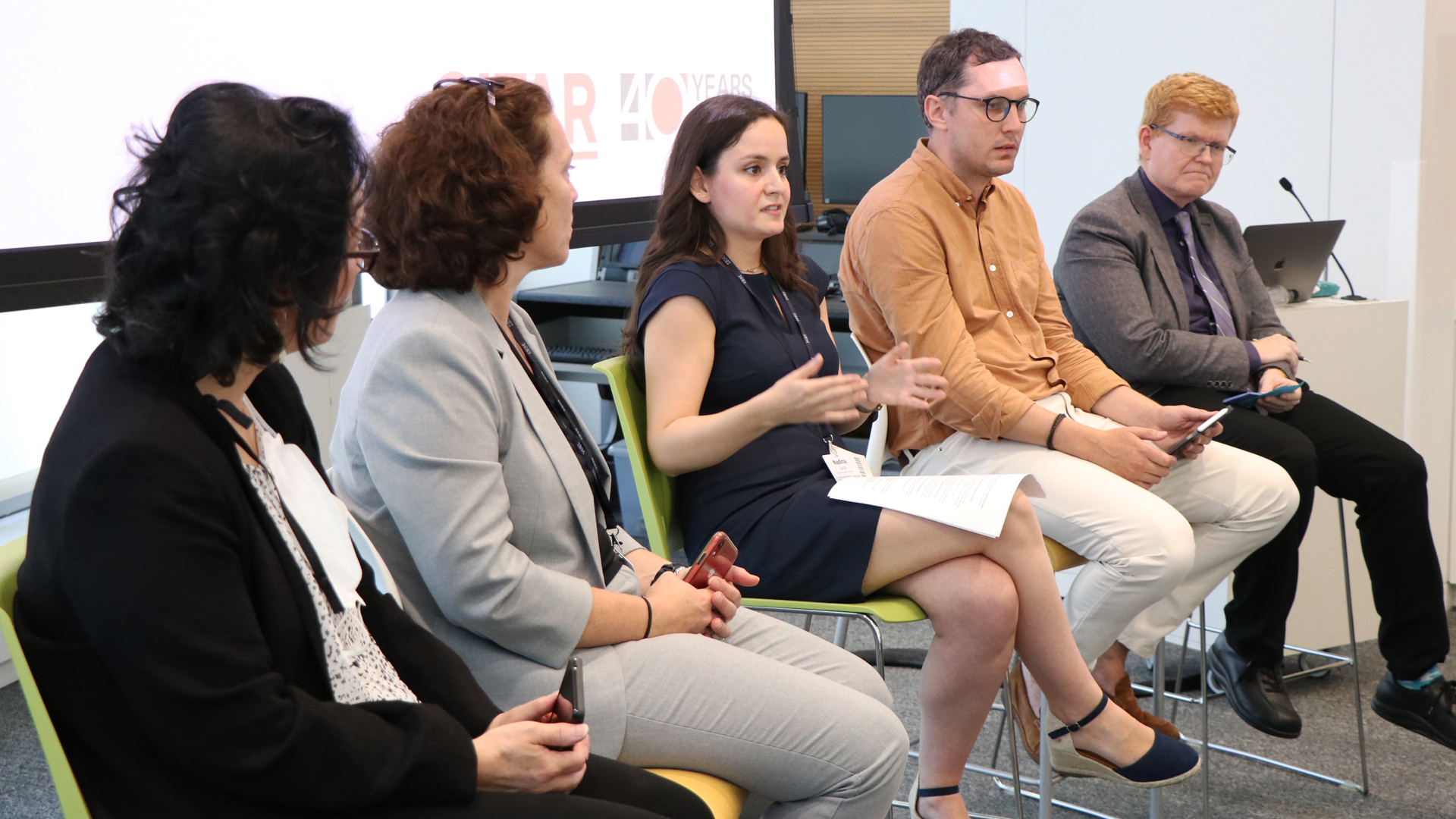By: Kathleen Sandusky
2 Nov, 2022

Photo L-R: Alice Liu, I-DAIR; Elissa Strome, CIFAR; Nadina Iacob, CEPS; Owen Rackham, The Alan Turing Institute; Eric Sutherland, PHAC.
CIFAR staff and members of our research community recently joined international thought leaders in New York City for the ninth edition of the Science Summit at the UN General Assembly (SSUNGA77). The summit was held in September during the 77th United Nations General Assembly. The Summit included over 1600 speakers across over 400 sessions. Leaders from government, academia, industry and multilateral institutions, including many UN agencies, met to discuss the role of science in attaining the United Nations Sustainable Development Goals across a broad spectrum of fields including international science diplomacy, technology, data sharing, global health, food security, climate change and biodiversity.
Lissa Matyas, CIFAR Vice-President of Global Government Affairs, is Co-Chair of the Science Summit. She moderated dozens of talks over the two weeks. “As a global leader advancing innovative models for international scientific collaboration at the very highest level, CIFAR was an invaluable partner in the development and delivery of this year’s Science Summit at UNGA,” comments Matyas. “It was truly exciting to see the many new collaborations and novel ideas being forged at this year’s meetings, with CIFAR playing a key role.”
Among the CIFAR speakers at the summit was CIFAR’s outgoing President and CEO Alan Bernstein, who spoke with Cheryl Moore, Director of Research Programmes at Wellcome. They discussed the need for new scientific models to solve the many challenges wrought by climate change, including food insecurity, water scarcity, global pandemics, and weakened supply chains.
“The taxonomy of fundamental versus applied research has become rather out of date and should be discarded,” said Bernstein during the panel discussion. “I don’t think it has much relevance to how research is actually done anymore.” Noting that CIFAR was an early supporter of Geoffrey Hinton‘s seminal work on deep learning and artificial intelligence, Bernstein pointed out that Hinton’s driving question was not about the many business applications that were to come from his work, but to understand how the human brain has the capacity to learn. “Geoff was pursuing the question of how humans learn by modeling it in a computer. Out of that inquiry came deep learning, which as we now know, went on to unlock trillions of dollars in investments. But it’s important to note that those later industrial uses were not what drove discovery.”
Elissa Strome, Executive Director of the Pan-Canadian AI Strategy at CIFAR, hosted a session to explore challenges and opportunities for international cooperation on health data. Following a panel discussion with scientists from the International Digital Health and AI Research Collaborative, the Centre for European Policy Studies, The Alan Turing Institute and the Public Health Agency of Canada, Strome facilitated an interactive workshop with online and in-person participants. Attendees shared their expertise and recommendations for action steps and meaningful collaborations.
“With the advent of machine learning and the rise of faster, cheaper and more readily available computing, we have an unprecedented opportunity to leverage the data of our digital world to deliver positive social impacts,” said Strome, who highlighted the many significant changes in digital health triggered by the global pandemic. “It has become clear for the whole world that there’s a huge opportunity to leverage health data for the public benefit. I’m hopeful that we can apply what we have learned through the course of these pandemic years to achieve greater collaboration and impact with the responsible use of health data.”
CIFAR Vice-President of Advancement Leslie McCarley moderated a discussion of the ways in which science philanthropy has become an increasingly important sector of the research enterprise, advancing science globally by supporting international scientific collaborations.
“Extensive international collaboration between researchers, science funders, policymakers, and other stakeholders continues to accelerate scientific discoveries,” says McCarley. “As such, we must include more talent and diverse perspectives to increase opportunities for breakthroughs. CIFAR is pleased to work with funders from private and public sectors to offer opportunities for researchers around the world. This allows them to collaborate and advance science for the benefit of all humanity and the planet.”
Also speaking at the Science Summit was Canada CIFAR AI Chair David Rolnick, who participated in scientific panels to discuss the roles of AI and machine learning in addressing climate change.
The Science Summit at the 78th UN General Assembly will be in partnership with UNESCO and is scheduled for September 12-29, 2023 in New York.